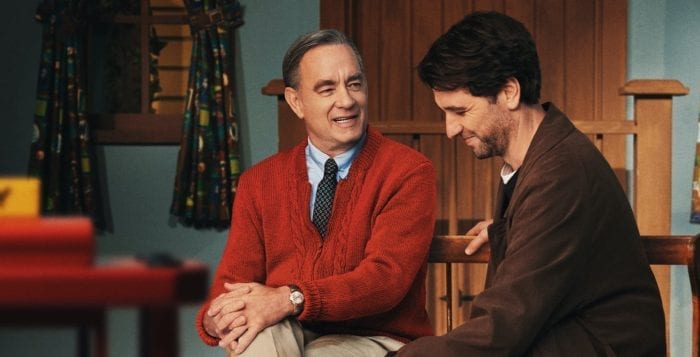Movie Review: ‘A Beautiful Day in the Neighborhood’ – The heart of an American hero
By Jeffrey Sanzel
There is no greater American icon than Fred Rogers — the Mr. Rogers of “Mr. Rogers’ Neighborhood.” Generations of children have grown up under the tutelage of the man whose sole quest was to let children be children. His soft-spoken and often simple wisdom has been explored, dissected and parodied for decades. But, ultimately, his pure and honest humanity has shown through.
A Beautiful Day in the Neighborhood is inspired by Tom Junod’s 1998 Esquire article “Can You Say … Hero?” Director Marielle Heller and screenwriters Micah Fizterman-Blue and Noah Harpster have chosen the source as a jumping-off place to create the fictional story of an emotionally lost and damaged journalist whose life is altered by profiling the beloved television host.
The film is in no way a biopic of Rogers. If one is seeking an account of Fred Rogers, then the heartfelt 2018 Won’t You Be My Neighbor? documentary explores Rogers with a wealth of archival clips and interviews. It is as both straightforward and as complicated as the man himself and an indispensable contribution to his legacy.

Instead, A Beautiful Day in the Neighborhood draws upon Rogers’ ethos and how it affected and continues to influence the world for good.
Matthew Rhys plays journalist Lloyd Vogel, whose closet full of demons has disconnected him from the world. The story focuses on the dysfunctional relationship with his estranged father (a dimensional Chris Cooper) who walked out on him and his sister when their mother was dying.
Vogel struggles to communicate with his frustrated wife (the always terrific Susan Kelechi Watson), to face his life as a new father, and to deal with the world in general. At first, he is resistant to the ministrations of Rogers, but gradually, he realizes the power of embracing Rogers’ philosophies. The film is Vogel’s arc, with Rogers a catalyst for change.
Rhys manages the transition from depressed and detached to self-aware and almost reborn with a slow, methodical intensity. It is an unsurprising performance but one in which we can invest. While the resolution is inevitable, his pain is palpable and his growing awareness authentic.
The surrounding actors are strong and Heller has brought out subtle and absorbing work from the entire company, including Christine Lahti (Ellen, Vogel’s Esquire editor), Enrico Colantoni (Bill Isler, the president of Family Communications), Maryann Plunkett (Joanne Rogers, Fred’s wife), Tammy Blanchard (Lorraine, Vogel’s sister), and Jessica Hecht (Lila Vogel, Vogel’s dying mother). The entire ensemble is fully present, bringing nuance to the action.
However, the heart of the film is Tom Hanks as Fred Rogers. There is no actor more suited to don the sweater than Hanks, and he does not disappoint. Eschewing imitation, Hanks evokes the soul of the man, making sure that his Rogers is not a hagiography. We see joy, pain, introspection and a man who struggles but never ceases to search for peace and understanding in a difficult world.
And while his screen time does not rival Rhys’, Hanks dominates each moment with an open presence that makes him unique among even the greatest movie actors. Whether engaging with his public, watching a playback of a scene he has just shot or voicing the Neighborhood puppets, he is riveting. A scene that focuses on a moment of silence in a Chinese restaurant is as wondrous as a subway car breaking out into the show’s theme song. It is all reflected in Hanks’ understated yet overwhelming portrayal.
The takeaway from A Beautiful Day in the Neighborhood is that we must face life’s trials and that we can grow from these challenges. It is a message — and a film — of which Fred Rogers would approve.







